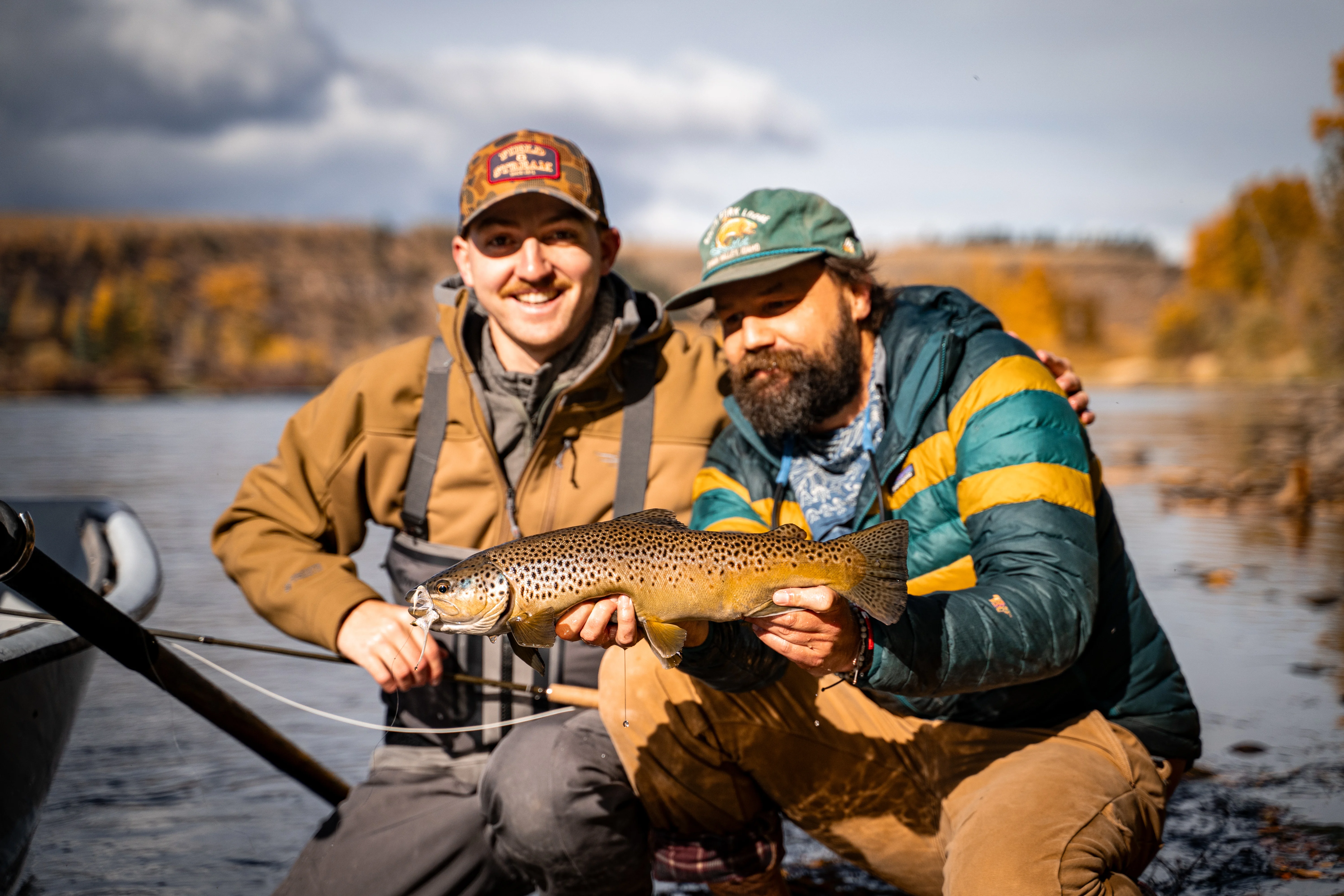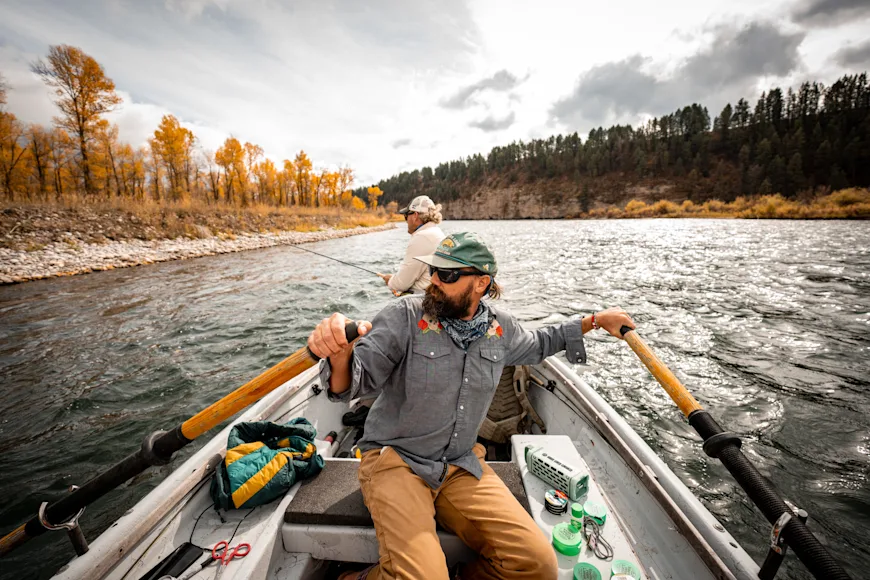Walking into South Fork Lodge, you wouldn't know that Oliver White owns the place. He's there to greet you, offer a drink, and talk fishing. White purchased the lodge in 2020 with a business partner and refurbished it into what it is today—an epic fishing camp. He's been managing lodges since his late 20s and has built a reputation as one of the most talented fly anglers in the world.
Many fishermen would recognize White from a number of short films and videos on YouTube. He is known for traveling to exotic places in search of fish and adventure. And while many of his stories have been well-documented on camera, he never expected to become a fishing guide, lodge owner, or TV personality. White just loves to fish, and in his 25 years of guiding around the world, he's captured the attention and respect of many in the industry.
Last fall, we had the chance to fish with White at his lodge on the South Fork of the Snake River. Afterward, we sat down with him to learn more about his path to becoming one of the most renowned fly anglers in the world today.

F&S: When and where did you become a fishing guide?
White: I started guiding while in college at the University of North Carolina. The summer after my junior year, in 2000, I went to Boone, North Carolina, and started working at Appalachian Angler. During my senior year, I scheduled all my classes on Tuesdays and Thursdays so I could guide more. When I graduated, I came out to Jackson Hole to guide in the summertime and then went to Argentina to guide in the winter.
F&S: Was becoming a guide always the plan?
White: I never intended to be a fishing guide. The plan was to go to law school when I was an undergrad. Then I got a job at a fly shop, not because I wanted to guide, but to get some deals on fishing gear. The job eventually segued into guiding.
F&S: On the river, you mentioned that you stopped guiding for a couple years to work for a hedge fund in New York City. What made you want to switch careers?
White: I was guiding in Argentina with a client, Bill Ackman, who owns Pershing Square—a giant hedge fund. The trip was to Tierra del Fuego for Sea Run Brown Trout, and I guided him for the week. We hit it off, and he said I should come work for him. I didn't take that seriously, but when I got back to Jackson Hole there was a box full of books and a little note from Bill that said, “Read the books. If you're interested, give me a call.”
I read all the books and followed up with Bill. He invited me to New York and I met him in the city. I had no interest in being at a hedge fund, but it was an incredible opportunity with limited downside. So I moved to New York and spent a couple of years working hard for his hedge fund. That's been the only traditional corporate career that I've ever had.
F&S: What did that experience teach you?
White: I couldn't do what I do now without that experience. That exposure was the bridge from being a fishing guide to an entrepreneur. It taught me financial acumen and how to raise money, which allowed me to grow into running lodges and businesses. Ultimately, I left New York and moved to The Bahamas to build a fishing lodge from scratch. I went from guiding to working in finance and then realized I wanted to be back in fishing, but I wanted to do more than just guiding. That was a direct segue into becoming an entrepreneur and a lodge owner.
F&S: Is that how you describe yourself now, as an entrepreneur?
White: People always ask me, “What do you do?” For the longest time I always told people I was a fishing guide, and I still feel that deep inside. I don't know that it's an accurate reflection anymore. So much of what I do now is creating experiences and memories for people around fishing. You were at South Fork Lodge. It's fishing focus, but it's also sitting by the fire and having a great meal and drinking cocktails and telling stories and kind of wrapping up that entire experience. That’s what I put my energy into now.

F&S: You mentioned that Flip Pallot has been a mentor for you. How long have you known Flip, and what have you learned from him?
White: I met Flip at a trade show, but didn’t get to know him until I was running Abaco Lodge. He had dinner with us one night and thought the lodge was the coolest thing. So he started spending a lot of time with me in The Bahamas. I never guided saltwater at that point. He taught me how to run a boat properly, how to pole properly, and how to explore. We spent a lot of time on the water together just fishing. He helped me train guides, and he's been a great resource, a great friend, and certainly a mentor this whole time. He continues to be.
F&S: If you type Oliver White into YouTube, dozens of videos and short films appear. Did you ever imagine yourself becoming a fishing personality?
White: It wasn't something I aspired to be. Even when I started doing it, I wasn’t comfortable with it. I just loved what I was doing, and I was going hard at it. When you have that energy and passion, great people gravitate towards you. Some people want to be on TV and want that claim to fame, but I do it reluctantly. I've certainly benefited from it, but it makes me uncomfortable. I focus on doing what I love and doing it with purpose and soul.
F&S: What do you think makes a great fly fishing film?
White: To be able to tell a great story. I've been lucky to work with some talented people who have helped shape interesting things that I've done into great stories. I can't say that I deserve any credit for that, particularly the Yeti film A Thousand Casts. The Felt Soul Media guys deserve all the credit. They crafted my life into a very compelling story, and I am really grateful for it.
F&S: Do you still guide today?
White: I do a lot more of curating and hosting international trips. Those are great opportunities where I work with other lodges to bring a group of people together and help create an experience. I'll also guide on these trips, but my main focus is to help entertain and play host and piece it all together. Occasionally, I'll guide a day on the South Fork for legacy clients or interviews or when I take my business partner on occasion.
F&S: Is there one species or place to fish that is your favorite?
White: If you gave me one more trip, it would be to the Seychelles. And from a species standpoint, Permit might be the one species I could put a name to. Otherwise, what I really love is sight fishing. If you can see the fish, make a cast, and watch the moment you've fooled them—that's my favorite.
F&S: What's the most adventurous trip you've taken?
White: I went to Bhutan looking for golden mahseer and we were traveling for almost a month. It was brutal to get there, and I caught two fish. I worked really hard to catch those two, but it was worth it. I would go back and do it again in a heartbeat. It was some of the hardest fishing I've done.
F&S: What’s your next adventure?
White: Trout fishing in Argentina. I think most people would tell you it's like what Montana, Wyoming, and Idaho used to be. There's no fences. There's no people. And the fishing's really spectacular.


